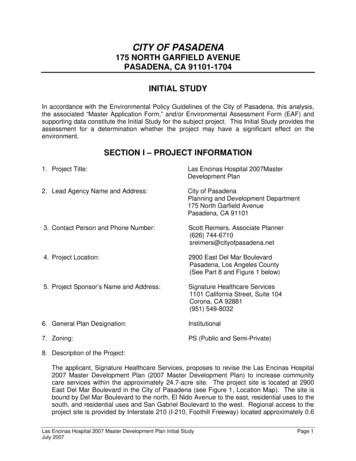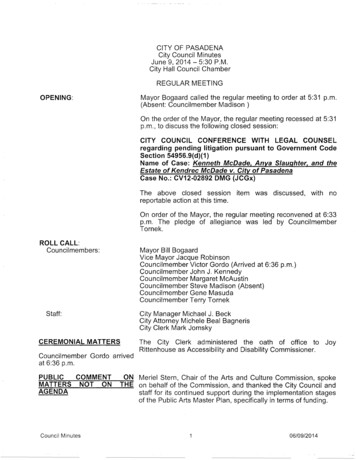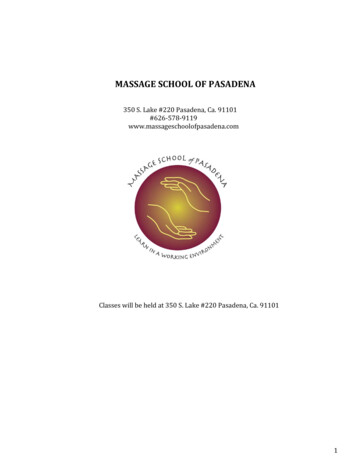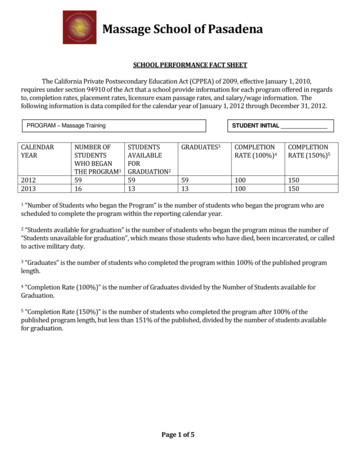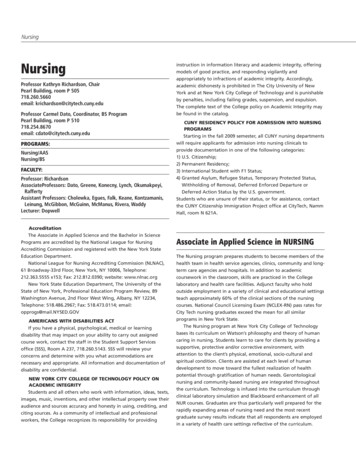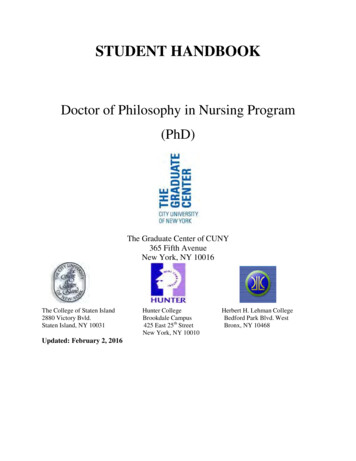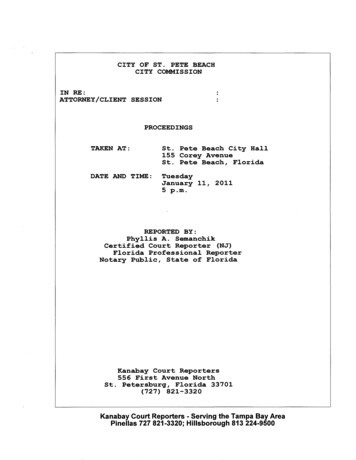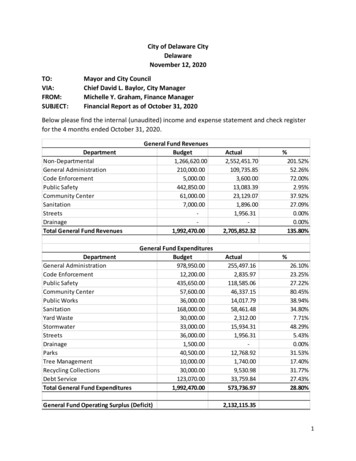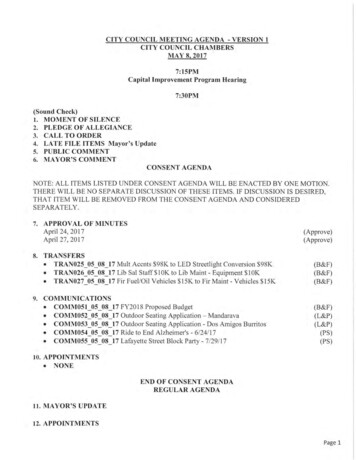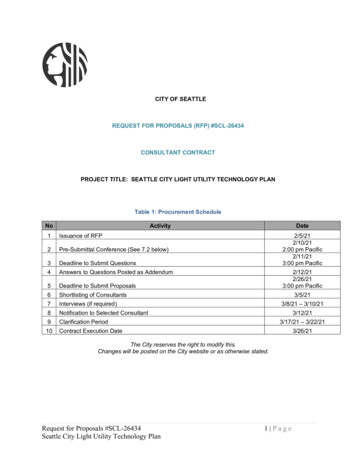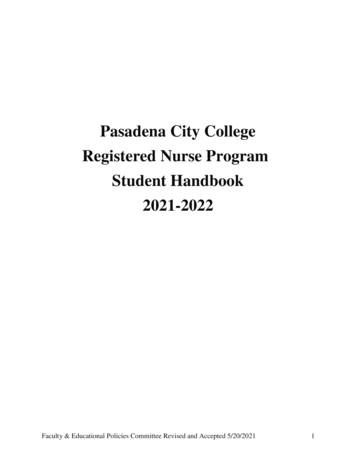
Transcription
Pasadena City CollegeRegistered Nurse ProgramStudent Handbook2021-2022Faculty & Educational Policies Committee Revised and Accepted 5/20/20211
Table of ContentsPasadena City College Health Sciences Division Nursing Faculty . 4Chapter 1 . 5Vision, Philosophy, Mission Statement . 6Program Student Learning Outcomes . 7Conceptual Framework. 8Chapter 2 . 9Integrity and Responsibility . 10Response to Interventions . 11Interpersonal Relations . 11Response to Patient Privacy and Confidentiality . . 12Stress Handling. 13Responsibility for Own Learning. 13Uniform Regulations –. 13Dress Code at clinical . 13Dress Code on Campus . 14Transportation. 14Parking . 14CPR Card . 14Malpractice Insurance . 15Use of Recorders. 15Use of Cell Phones or Smart Watches . 15Responsibilities of Class Officers . 15Child Care . 16Student Immunization and RN Program Technical Standards . 16Background Checks . 19Social Security Number . 19Faculty & Educational Policies Committee Revised and Accepted 5/20/20212
Chapter 3 . 21Progression Policy . 22Repetition of Nursing Courses . 22Grading System for Nursing Courses . 23Dosage Calculation Policy . 23Testing Policy . 24Credit by Exam / Challenge Policy . 26Academic Probation Policy and Procedure . 29Clinical Probation Policy and Procedure . 31Early Alert & Contract for Academic/Clinical Issues Policy and Procedure . 35Readmission Policy . 35Medication Error Policy and Procedure. 36Conflict Resolution / Grievance Procedure . 37Student Attendance . 37Clinical Attendance Policy . 37Chapter 4 . 40Student Services for Success . 41Strategies and Recommendations for Student Success . 41Learning Assistance Center . 41Special Services. 41Tutoring Services . 42Instructional Computing Center. 42Videotaping / DVDs . 42Computer Labs . 42Health Sciences Resource Lab. 42Veterans Support . .42National Student Nurses’ Association . 44Library . 44Scholarships and Financial Aid . 44Faculty & Educational Policies Committee Revised and Accepted 5/20/20213
Personal Counseling Services . 44Student Health Services . 44Impaired Nursing Students . 45Student Injuries . 46Board of Registered Nursing Policy and Denial of Licensure . 46Student Guidelines for Pinning Ceremony . 47APPENDIX . 48American Nurses Association code of Ethics for Nurses with Interpretive Statements. 49Nursing Student Handbook Signature Form . 69Faculty & Educational Policies Committee Revised and Accepted 5/20/20214
Pasadena City College Health Sciences Division Nursing FacultyDivision DeanDr. Micah YoungNursing Program DirectorMarylynn G. Aguirre, PhD, MSN, RNAssistant Nursing Program DirectorsThomas Berg, MSN, RNKiriaki Dieguez, MSN, RNJoyce Muyingo, MSN, RNInstructorsDeborah J. Hileman-Ford, MS, MN, RNMary Huffman, MSN, RNKristin Hyatt, MSN, RNLaurinda M. Kettle, MSN, RNPauline Soo Hoo-Lew, MN, RNChurairat Mittongatare, MSN, RNJeong O, PhD, MSN, RN, CNEDeanna Sanchez, MSN, RNVita Torigoe, RN, MSNJane Tsao, PhD, MN, PHN, RN, CCRNValerie Udeozor, MSN, RNPaula Vento, MSN, RNFaculty & Educational Policies Committee Revised and Accepted 5/20/20215
Chapter 1Philosophical Foundations ofCurriculumFaculty & Educational Policies Committee Revised and Accepted 5/20/20216
Vision, Philosophy, Mission StatementVisionThe vision of the Pasadena City College Registered Nursing Program is to have a nursing program thatmeets the challenge of preparing future nurses who have the knowledge, skills, and attitudes necessary tocontinuously improve the quality and safety of the healthcare system within which they work. PhilosophyWe believe that:The Art and Science of Nursing are able to empower and transform situations with individuals towardfavorable health changes, and healing is the desired outcome of nursing. The science of nursing is basedon the acquisition of knowledge, skills, and attitudes across the curriculum. The art of nursing is createdin the human realm, which is the actual interaction of the nurse and the individual. The nurse acts inpartnership with and empowers individuals and families to improve the health of the nation and the world.The Person (humanity) includes the totality of the human being and the interconnectedness of body, mind,emotion, spirit, energy, society, culture, relationship, context, and environment. Humanity includes andawareness of the interconnectedness of individuals to the human and global community.The Environment is the space in which all living systems participate and interact, including the physicalbody along with cultural, psychological, social, and historical influences and includes both the externalphysical space and the internal mental, emotional, social, and spiritual experience.The Health-Illness continuum views health as a dynamic balance on multiple levels and seeks to identify,restore, and support a person’s innate reserve as the means to enhance well-being and health through-outthe life cycle.Nursing Education at PCC supports self-regulated learning by promotion the knowledge, skills, andattitudes that enable students to assume increasing responsibility for their learning path. Faculty serve asmentors, mediators, and knowledgeable consultants. Faculty is committed to applying educational andnursing principles with sensitivity to the diverse needs of students’ different cultural, ethic, socialbackground, support systems, and learning styles.Mission StatementConsistent with the Pasadena City College mission statement and Educational Master Plan, the mission ofthe PCC RN program is to create a high quality, caring, transformational environment that promotes anacademically rigorous and comprehensive curriculum of professional excellence, lifelong scholarship, andinnovation in nursing. We provide evidence based nursing education of members of diverse communitiesthat prepares learners to meet health care needs within our local and global communities throughtechnology, leadership, advocacy and collaboration. The PCC RN Program enhances the economicconditions and the quality of life in our community.Faculty & Educational Policies Committee Revised and Accepted 5/20/20217
Program Student Learning Outcomes1.Deliver patient centered care that recognizes the patient or designee as the source ofcontrol and full partner in providing compassionate and coordinated care based on respect forpatient’s preferences and values and needs.2.Use teamwork and collaboration to function effectively within nursing and interprofessional teams, fostering open communication, mutual respect and shared decision-makingto achieve quality patient care.3.Develop an evidence based practice by integrating best current evidence with clinicalexpertise and patient/family preferences and values for delivery of optimal health care.4.Improve safety by minimizing risk of harm to patients and providers through individualperformance and quality improvement system methods to continuously improve the quality ofhealth care systems.5.Use informatics, including information and technology, to communicate, manageknowledge, mitigate error, and support decision making.6.Adhere to standards of professional practice by being responsible for his/her actions andbehaviors and practicing nursing within legal, ethical, and regulatory standards.Faculty & Educational Policies Committee Revised and Accepted 5/20/20218
Conceptual FrameworkThe PCC RN program conceptual framework provides a sequence of learning experiences that will enablestudents to achieve the desired educational outcomes. The pervasive threads of patient centered care,teamwork and collaboration, evidence-based practice, quality improvement, safety, and informatics arethe competencies that students must possess to successfully demonstrate the program outcomes ofadvocate, clinician, leader and teacher in the nursing profession. Learning experiences within the leveledcoursework of supporting knowledge, foundational nursing, beginning nursing, intermediate nursing andadvanced nursing facilitate students’ attainment of these competencies and the resulting outcomes.The conceptual framework is drawn from the RN programs delineated mission statement, philosophicalbeliefs and vision of the discipline of nursing within the Pasadena City College Associate Degree nursingprogram. The organizing framework is conceptual, but offers a visual structure of the nursing phenomenaand their relationships. The PCC RN program curriculum exists as a means for creating access toknowledge about nursing and the conceptual framework provides the structure of cataloging andretrieving the knowledge that is essential to the process of teaching and learning.The PCC conceptual framework ensures that the nursing graduates embody the competencies nurses needfor professional practice. Patient centered care, teamwork and collaboration, evidence-based practice,quality improvement, safety and informatics are the critical competencies the students need to possess toattain the outcomes. The competencies form the foundation of the design of evaluation tools used in theassessment of student learning. The competencies to the level of learning and performance in eachnursing course. Faculty expects students to exhibit these identified competencies regardless of the healthcare setting and use the competencies to guide the development and implementation of appropriatelearning experiences across the courses throughout the curriculum. An outcome-focused, competencybased curriculum places the emphasis on the development of the knowledge, skills and attitudes studentsneed to meet quality and safety standards of nursing. The competencies capture the growth studentsexperience in PCC’s nursing educational program.The conceptual framework contains the outcomes that are those characteristics students should display atthe completion of the PCC RN program. The graduates of the PCC RN program are expected to moveinto a changing health care system that includes the increasing acuity of clients in acute-care settings,shifting emphasis to consumer involvement in health care decisions and increasing demands for highquality health care at an affordable price. The essential qualities needed to practice in a contemporaryhealth care environment include being a skilled clinician, leader, and teacher, which then allow PCC’sgraduates to function as the client’s advocate in all area of health care. The outcomes of PCC’s nursingprogram mirror nursing practice expectations and are lasting skills that can be used to transform nursingpractice. There outcomes epitomize the behaviors faculty believe are critical for successful professionalnursing practice. As a graduate of PCC Associate Degree Nursing program, the student becomes acompetent clinician in client care, a participant in nursing leadership, has the ability to teach and educatethe public regarding increasing wellness, and is able to act as the client’s advocate in all health caresettings.Conceptual Framework MapFaculty & Educational Policies Committee Revised and Accepted 5/20/20219
Faculty & Educational Policies Committee Revised and Accepted 5/20/202110
Chapter 2Responsibilities and Standardsof Student ConductFaculty & Educational Policies Committee Revised and Accepted 5/20/202111
PASADENA CITY COLLEGE HEALTH SCIENCES DIVISION REGISTEREDNURSING PROGRAM RESPONSIBILITIES AND STANDARDS OF STUDENTCONDUCTPasadena City College seeks to maintain an environment in which there is freedom to learn andin which there is respect and dignity exercised for all members of the campus community.Students are encouraged to develop the capacity for critical judgment and to exercise their rightsto free inquiry and free speech in a responsible non-violent manner.Students are expected to conduct themselves as mature citizens in the campus community andcomply with college policies and regulations and civil and criminal laws of the city, state andnation. Inappropriate conduct by students is subject to discipline as provided in Pasadena AreaCommunity College District Policy and Procedures.In addition to campus rules and regulations, the nursing student is expected to demonstrateprofessional practice. Making decisions based on a sound foundation of ethics is an essential partof nursing practice in all specialties and settings. The PCC RN program uses the ANA Code ofEthics for Nurses with Interpretive Statements (appendix) as a guide for carrying out nursingresponsibilities in a manner consistent with quality in nursing care and the ethical obligations ofthe profession. Nursing students are required to consistently comply with the ethical standards ofthe nursing profession to meet required standards of practice.Integrity and ResponsibilityThe student:1. Demonstrates responsibility for personal growth and development in the cognitive,psychomotor, and affective realms.2. Takes responsibility for his/her own actions, takes initiative to follow through withcorrective action when an error is committed, identifies the cause(s) of error and makesplans to prevent recurrence.3. Demonstrates awareness of own strengths and limitations.4. Protects patient’s privacy and maintains confidentiality.5. Functions within ethical and legal professional guidelines.6. Complies with attendance and punctuality requirements.7. Complete tasks in clinical setting within the allotted time.8. Is encouraged to participate in student professional organizations and related activities.9. Will maintain academic honesty and satisfactory standards of citizenship at all times onthe campus and in the community. Unsatisfactory citizenship includes, among otherthings, cheating, plagiarism, other forms of academic dishonesty, actions disruptive toongoing teaching and learning process, and hazing.10. Will keep a copy of all paperwork (such as CPR card, malpractice, and health insurance,including current TB screening and Influenza vaccination) and be able to present thispaperwork to clinical agency.Faculty & Educational Policies Comm
intermediate nursing and advanced nursing facilitate students’ attainment of these competencies and the resulting outcomes. The conceptual framework is drawn from the RN programs delineated mission statement, philosophical beliefs and vision of the discipline of nursing within th
